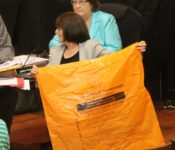Photo: Police Chief Richard McLaughlin in the current crowded police headquarters.
Last fall, the first cost estimates to replace the outdated and dilapidated police department headquarters and crumbling Department of Public Works building came in at a staggering $50 million for both projects over 10 years.
But through the innovative work of a talented Cambridge architect and the cobbling together of a financing plan by town officials, the police and DPW can expect upgraded and improved facilities at a fraction of the initial price tag and with the work completed in a tenth of the time.
“The architect has done a fabulous job,” said Belmont Police Chief Richard McLaughlin of Ted Galante of The Galante Architecture Studio in Harvard Square whose design plan based on renovations, creative land use and additions has the project coming in at just under $9 million with both updated facilities operational by 2020.
A public presentation by Galante on the design of the Police Headquarters and DPW building will be given on Thursday, May 24 at 7 p.m. at the Beech Street Center.
The current police headquarters across from Town Hall at Pleasant Street and Concord Avenue is nearing its ninth decade of use and shows it; space is at a premium, there is no safe transfer of prisoners into the lockup from the outside, female officers have no lockerroom facility, paperwork and supplies are stored willy-nilly throughout the building and the second floor lacks handicap access.
Last November, the Special Town Meeting approved a new committee, the DPW/BPD Building Committee, which in one of its first moves hired Galante to lead the design of the project.
“He’s been very creative and very ingenious. Every week he came up with something new and [the committee] said ‘Wow!”, said Ann Marie Mahoney, chair of the committee. To the surprise of the group, Galante “found a way to achieve everything … in the current location in such a way that we no longer see a need for a new police station,” said Roy Epstein, chair of the Warrant Committee and member of the building committee.
“He’s taken this to another level because I really didn’t think it could be done. I said we need to have the facilities here to be able to support all our work and this design does that. He made believers out of me and other people,” said McLaughlin.
Galante’s design is the functional equivalent of a new station, said Epstein. The plans call for a new second floor located in the rear of the station adjacent to the commuter rail tracks that will hold office space and a new elevator. There will be a three-vehicle garage that will increase parking. The current garage will be transformed into large locker rooms and showers for male and female officers. The building will have a new electrical system along with air conditioning, updated plumbing and other upgrades.
On the left side of the headquarters, a new interior sally port to facilitate the transfer of arrested individuals will be located. To the right of the port will be a two-story addition with storage on the first floor and new prisoner holding cells and a processing center.
With work scheduled for the back and the side closest to Pleasant Street will leave intact the historic Georgian-style front facade along Concord Avenue. The renovation and additions will be done in stages so not to require officers to be housed off-site.
“We are anticipating that construction will be completed on the police station in the fall of 2020,” said Mahoney.
The upgrade at the Department of Public Works will use modular units, similar to those at town schools. In the front of the main building will be a small unit which will be dedicated to much-needed office space. In the rear of the building will be three connected “mods” housing men and women’s showers and locker rooms, training rooms and a rest area for workers who are plowing snow or fixing broken pipes round the clock.
There will also be washing machines and other areas for cleaning services “because if you’re out there working on a sanitary sewer all day, currently there is no facility to clean your clothes before going home,” said Epstein. In the interior of the building will be an expanded break/cafe area and more office space. If approved, the DPW fix can be done by the fall of 2019.
The total bill for both buildings will be $8.9 million ($6.7 million for the Police headquarters, $1.2 million for the DPW); $7.4 million requires a vote by Town Meeting to issue bonds with $1.5 million covered by reserves. Best yet, “by inspired work” by Town Treasurer Floyd Carman and Town Administrator Patrice Garvin, the total cost can be done without a need for a debt exclusion,” said Epstein. Carman said the town has “sufficient monies” in revenue coming from capital turnbacks, premium dollars and retiring debt “to cover the debt service of $440,000 for the next 30 years.”

